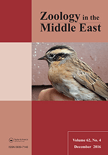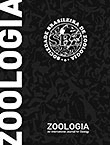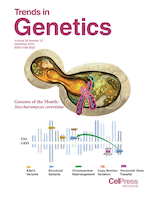
CONSERVATION GENETICS
metrics 2024
Unlocking Genetic Insights for Species Survival
Introduction
CONSERVATION GENETICS is a leading journal dedicated to the study of genetic diversity and its implications for conservation biology. Published by SPRINGER in the Netherlands, it serves as a vital resource for researchers, professionals, and students interested in the intersection of genetics and environmental stewardship. With an ISSN of 1566-0621 and a focus on articles published since 1994, this journal currently holds impressive rankings, including Q2 in Ecology, Evolution, Behavior, and Systematics and Q3 in Genetics as of 2023, making it a pivotal platform in these fields. Although not an Open Access journal, it provides substantial insights into conservation strategies and genetic research, facilitating the understanding of species preservation and biodiversity. By contributing to the discourse surrounding genetic factors in conservation, CONSERVATION GENETICS underscores the importance of integrating genetic knowledge for effective management of natural resources and ecosystem sustainability. Join a community of scholars committed to advancing the science of conservation genetics through innovative research and collaborative inquiry.
Metrics 2024
 0.54
0.54 2.00
2.00 2.20
2.20 82
82Metrics History
Rank 2024
Scopus
IF (Web Of Science)
JCI (Web Of Science)
Quartile History
Similar Journals

GENETICS AND MOLECULAR BIOLOGY
Elevating knowledge in genetics and molecular biology.GENETICS AND MOLECULAR BIOLOGY, published by the SOC BRASIL GENETICA, is a prominent journal dedicated to the advancement of knowledge in the fields of genetics and molecular biology. Since its inception in 1998, this Open Access journal has served as a vital platform for researchers, professionals, and students to disseminate their findings and engage with the latest innovations and discoveries. With an impact factor that reflects its growing influence, GENETICS AND MOLECULAR BIOLOGY ranks in the Q3 category for both genetics and molecular biology as of 2023, indicating its position within the academic community. The journal is indexed in Scopus, highlighting its commitment to maintaining rigorous peer-review standards while providing wide-reaching access to quality research. Operating out of Ribeirão Preto, Brazil, it fosters a collaborative environment for academic discourse and research development not only in Brazil but also globally. The journal encourages submissions that explore a wide range of topics in genetics and molecular biology, making it an essential resource for anyone involved in these dynamic fields.

Journal of Asia-Pacific Biodiversity
Illuminating the path to biodiversity conservation and sustainability.Journal of Asia-Pacific Biodiversity is an esteemed academic journal dedicated to advancing knowledge in the dynamic fields of biodiversity, ecology, and related biological sciences. Published by the NATL SCIENCE MUSEUM & KOREAN NATL ARBORETUM, this journal serves as a crucial platform for researchers and professionals seeking to explore and disseminate impactful findings pertaining to the Asia-Pacific region's rich biological diversity. With an E-ISSN of 2287-9544, the journal is indexed in leading databases, achieving a Q3 ranking across various categories in 2023, including Animal Science and Zoology, Ecology, Insect Science, and Plant Science. It strives to unite scientific research across disciplines, thus fostering a deeper understanding of ecological dynamics and conservation efforts within this vital region. The journal operates with an open access policy, ensuring that findings are widely available for widespread benefit, making it an essential resource for students, researchers, and environmental practitioners alike. Since its initiation in 2013 and continuing through 2024, the journal remains committed to delivering high-quality, peer-reviewed articles that contribute significantly to the global conversation on biodiversity and ecosystem sustainability.

Annual Review of Animal Biosciences
Unveiling Insights in Animal Health and GeneticsThe Annual Review of Animal Biosciences, published by Annual Reviews, is a premier journal in the fields of Animal Science, Biotechnology, Genetics, and Veterinary Sciences. With a remarkable impact factor and distinguished rankings placing it in the top quartiles of these disciplines—namely Q1 for Animal Science and Zoology, Biotechnology, Genetics, and Veterinary Science—the journal serves as an authoritative source for cutting-edge research and insights. The Annual Review of Animal Biosciences synthesizes comprehensive reviews by leading experts, facilitating the advancement of knowledge and applications in animal biology. While it is not an open-access publication, its rigorous peer-review process upholds high academic standards, making it an essential resource for researchers, professionals, and students dedicated to understanding animal health, genetics, and biotechnological advancements. Located in Palo Alto, California, this journal is a vital contributor to the global discourse in these rapidly evolving fields.

ZOOLOGY IN THE MIDDLE EAST
Advancing Zoological Insights in a Diverse RegionZoology in the Middle East, published by Taylor & Francis Ltd, is a pivotal journal dedicated to advancing the field of zoological research with a distinct focus on the rich and diverse fauna of the Middle Eastern region. With its ISSN of 0939-7140 and an E-ISSN of 2326-2680, this journal has successfully carved out a niche for itself since its inception in 1986, covering topics of significant relevance to animal science and zoology, as evidenced by its Q2 ranking in the 2023 category quartiles. Although it operates as a subscription-based journal, it aims to disseminate high-quality research articles, reviews, and case studies that contribute to the understanding of animal biodiversity and conservation in the Middle East. With a Scopus ranking placing it in the 38th percentile of the agricultural and biological sciences category, Zoology in the Middle East serves as an essential resource for researchers, professionals, and students who seek to deepen their knowledge and appreciation of the region's zoological heritage. Scholarly contributions to this journal not only enhance scientific discourse but also inform conservation strategies and policy-making in an area that is critical to global biodiversity.

Zoologia
Unlocking the Secrets of BiodiversityZoologia, published by the SOC BRASILEIRA ZOOLOGIA and UNIV FEDERAL PARANA, is a premier open-access journal dedicated to the field of zoology and related disciplines. Established in 2009 and based in Brazil, this journal has quickly positioned itself as a vital resource for researchers, professionals, and students, providing a platform for innovative research and comprehensive reviews in animal science and zoology. With an H-index indicative of its growing citation impact and a current Scopus ranking placing it in the 46th percentile of its category, Zoologia focuses on increasing the visibility and accessibility of cutting-edge zoological research. The journal aims to advance the understanding of animal biology, ecology, and conservation, making it an essential read for those invested in animal science. As an open-access publication, it ensures that knowledge dissemination is unrestricted, fostering a collaborative scientific community striving towards impactful conservation and biodiversity initiatives.

TRENDS IN GENETICS
Connecting Discoveries to the Future of GeneticsTRENDS IN GENETICS, published by CELL PRESS, is a leading journal in the field of genetics, recognized for its significant impact on research and advancements in the discipline. With an impressive Scopus ranking of #10 out of 347 in the category of Genetics and a 97th percentile ranking, this journal stands as a premier platform for publishing innovative, high-quality articles that shape the future of genetic research. Since its inception in 1985, TRENDS IN GENETICS has been at the forefront of the genetic sciences, continuously disseminating crucial findings while maintaining a strong commitment to scientific rigor and integrity. Although it does not currently offer open access options, its rigorous peer-review process ensures that only the most relevant and groundbreaking studies make it to publication. Scholars and practitioners in genetics will find this journal to be an invaluable resource for keeping abreast of the latest developments, trends, and methodologies that drive the field forward.

Mitochondrial DNA Part B-Resources
Pioneering Open Access Resources for Genetic ResearchMitochondrial DNA Part B-Resources, published by TAYLOR & FRANCIS LTD, is a prominent academic journal focusing on the vast and evolving field of genetics and molecular biology. As an open access resource, it is dedicated to providing valuable insights and comprehensive data on mitochondrial DNA, an area crucial for understanding cellular functions, genetic inheritance, and various diseases. Although relatively new, having commenced in 2016, the journal has gained recognition with its current Scopus rankings placing it in the lower quartiles for both Genetics and Molecular Biology. It serves as an essential platform for researchers, professionals, and students at the intersection of genetics and biotechnology, fostering collaboration and innovation. With a commitment to quality research and accessibility, Mitochondrial DNA Part B-Resources is poised to contribute significantly to the scientific community until at least 2024 and beyond.

APIDOLOGIE
Championing the Study of Nature's Essential PollinatorsAPIDOLOGIE is a premier journal published by SPRINGER FRANCE, specializing in the multidisciplinary field of insect science with a particular focus on the biology and ecology of bees and other pollinators. Established in 1977, this esteemed journal has garnered an impressive reputation, ranking Q1 in Insect Science as per the 2023 category quartiles, and is recognized in the top 14% of its field, as per its Scopus ranking (#25 out of 181 in Agricultural and Biological Sciences). APIDOLOGIE serves as a vital platform for researchers, professionals, and students alike, aiming to disseminate high-quality, peer-reviewed research that advances our understanding of apidology and its applications. With its commitment to fostering innovative scientific inquiry, APIDOLOGIE provides a critical resource for those invested in the sustainability and preservation of pollinator species. Although it does not offer Open Access options, the journal remains accessible through institutional and personal subscriptions, ensuring that cutting-edge research continues to reach a broad audience.

SILVAE GENETICA
Exploring the genetic secrets of our forests.SILVAE GENETICA is a dedicated academic journal in the field of forestry and genetics, published by SCIENDO. Based in Germany, this journal has been a key platform for advancing knowledge in tree genetics and management since its inception. The journal has demonstrated its commitment to quality research with its categorization in the Q3 quartile for Forestry and Q4 for Genetics as of 2023, indicating its relevance and contribution to the respective fields. With an ISSN of 0037-5349 and an E-ISSN of 2509-8934, SILVAE GENETICA covers a diverse range of topics related to the genetic analysis and improvement of forests, employing innovative techniques beneficial for both researchers and practitioners. The journal is indexed within Scopus, ranking #76 in its category for Agricultural and Biological Sciences and #281 for Genetics. While it does not offer Open Access, the importance of the journal's contributions to forestry science and genetic studies cannot be overstated, making it an essential resource for researchers, professionals, and students alike.

Neotropical Biology and Conservation
Exploring the Rich Tapestry of Neotropical LifeNeotropical Biology and Conservation, published by Pensoft Publishers, serves as a pivotal platform for researchers and professionals dedicated to the understanding and preservation of biodiversity in the Neotropical region. This Open Access journal, operational since 2006 and based in Brazil, invites contributions that delve into the complexities of ecology, evolution, and conservation strategies pertinent to the diverse ecosystems of South and Central America. With a commendable 2023 impact factor reflected in its Q3 rankings across multiple categories including Animal Science, Ecology, and Plant Science, it stands as a valuable resource for academics seeking to publish innovative findings and foster dialogue in these critical areas of study. The journal's commitment to open access ensures that knowledge is readily available to anyone interested in advancing the field of neotropical biology and conservation. Join the global conversation and contribute to the vital work of preserving our planet’s rich biological heritage through rigorous research published in this esteemed journal.